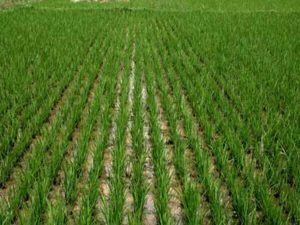
Rice Farmers at Ndi Oji Abam in Arochukwu Local Government Area of Abia State are calling on the government to provide adequate conducive environment to enable them cultivate more rice that would assist in cushioning the effect of economic recession on food security.
The farmers, who have been growing rice for more than two decades, feel alienated from the government agricultural programme and lament lack of adequate rice seedlings during planting season, fertilizers, pesticides, milling machines and cost of transporting the rice from the farm to the village due to the deplorable state of Ndi Oji Abam Road infrastructure.
However, the state government has sympathised with them and hinted that the roads would receive attention as soon as possible while the Agriculture Anchor Programme would ensure that they get all the necessary facility to enable them cultivate rice with ease.
Large hectares of rice farm located at Ndi Oji Abam are being cultivated by these farmers who are saddled with the challenges of trekking long miles as vehicles often get stuck in the mud due to the impassable road while underage boys take up the task of chasing the birds away to stop them from feeding on the rice.
Although there seem to be a kind of rehabilitation on some portions of the road, the bad sections are still not passable by vehicles. Only motorcycles which still need to manoeuvre the red muddy road use the road.
At the Rice mill, out of the three shanty mill house, only one mill is functioning and the miller has to accommodate customers that want to mill their rice in the small space with no windows to let out the dust from the machine when it is working.
Under this condition, more than 100 bushels of rice covered with skin is being milled to edible form daily for consumption.
On what the government is doing to assist, the Commissioner of Agriculture, Uzo Azubike, told reporters that the implementation of the Agricultural Programme and Integrated Rice Mill would take care of the challenges.
He assured them that they would get all the necessary assistance during planting and harvesting period.
Meanwhile, the rice farmers may have to endure for a while until the implementation of the Agriculture Programme that would ensure they get all the necessary assistance and a one million Naira profit for a hectare of rice cultivated.
In Nigeria today a bag of rice is over 17,000 Naira (over $46) and the cereal is the most consumed staple food by Nigerians.
The Nigerian government, through the Central Bank, is empowering rice farmers through an Anchor Borrower Scheme to boost yield and meet a 2019 sufficiency target.
The government had in June set up a National Rice and Wheat Task Force to set up targets that would yield comprehensible and self-evident results in rice and wheat production.
At the inauguration of the Task Force on Tuesday Vice President Yemi Osinbajo said: “What we are trying to achieve is that agriculture is our main stay and we are trying to evolve a strategy for our economy, a strategy for employment and a strategy for feeding our people”.
Professor Osinbajo said that feeding the nation’s population was the focus of the Buhari administration.
“Rice and wheat is our main focus, and making sure that in one year we can show the world that we are serious,” he stressed.
Emphasising on the need to develop strategies to rejuvenate the whole value chain, he gave terms of reference to the panel.
The panel is to set up production targets for rice and wheat in the participating states, determine the scope and particulars for government support needed towards the attainment of the set targets and consider and proffer the best off-take and marketing arrangements that will encourage maximum effort among farmers and millers.

